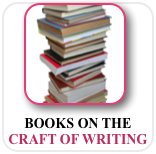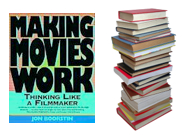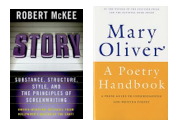|
 Why reinvent the wheel? Don't make the
mistake of assuming that you either have God-given talent or
not and you're going to find out when, on that gloriously perfect
day in the future, you can spent three obligation-free weeks
at a cabin in the woods, just you and the laptop. Why reinvent the wheel? Don't make the
mistake of assuming that you either have God-given talent or
not and you're going to find out when, on that gloriously perfect
day in the future, you can spent three obligation-free weeks
at a cabin in the woods, just you and the laptop.
Would you attempt to learn car repair or, say, become a 5 star
chef by going off by yourself?
You need teachers, but they need not be local nor even living,
because, happily for us all, so many excellent writers, some
long gone, have written books on the craft of writing. I have
learned from all these books, and I continue to learn as I reread,
again and again.
This list is frequently updated and suggestions
are most welcome.
 See also A
Reading List for Writing Across Borders and Cultures. See also A
Reading List for Writing Across Borders and Cultures.
 See also my
many articles and blog posts on craft here. See also my
many articles and blog posts on craft here.
 Boorstin, Jon,
Making
Movies Work:Thinking Like a Filmmaker Boorstin, Jon,
Making
Movies Work:Thinking Like a Filmmaker
Also helpful for thinking about how and why a reader enjoys a
novel or memoir.
Butler, Robert Olen, From
Where You Dream: The Process of Writing Fiction
Brilliant.
Chiraella, Tom, Writing
Dialogue: How to Create Memorable Voices and Fictional Conversations
that Crackle with Wit, Tension and Nuance
Expert and thorough.
 Field, Syd, Screenplay:
The Foundations of Screenwriting Field, Syd, Screenplay:
The Foundations of Screenwriting
Excellent for plot.
Fussell, Paul, Poetic
Meter & Poetic Form
More than a little bit crunchy and most of it won't interest
the average prose writer, but the chapter on scansion is worth
the price of the book, and, for any prose writer aiming to achive
vividness in their writing, worth rereading multiple times.
Gardner, John, The
Art of Fiction: Notes on Craft for Young Writers
Forget the subtitle, "for young writers". This
is a book for writers of any age, and not necessarily beginners.
The chapter "On Common Errors" is a gem. Also highly
recommended for writers of creative nonfiction.
Gerard, Philip, Creative
Nonfiction: Researching and Crafting Stories of Real Life
Writing a memoir or a longer, more
thoughtful piece of journalism? Use this book as your project's
road map.
Goodman, Richard, The
Soul of Creative Writing
Highly recommended. Especially strong
on language.
Hills, Rust, Writing
in General and the Short Story in Particular
The best book I've found on writing short stories.
Jackson, Bruce, The
Story Is True: The Art and Meaning of Telling Stories
Thinking more about the listener
(or the reader)... Read my blog post about this fascinating collection
of essays here.
McKee, Robert, Story:
Substance, Structure, Style, and the Principles of Screenwriting
 A
profound and essential book about narrative structure, also useful
for writers in other genres, including the short story, novel,
creative nonfiction, and more. A
profound and essential book about narrative structure, also useful
for writers in other genres, including the short story, novel,
creative nonfiction, and more.
Newport, Cal, So
Good They Can't Ignore You: Why Skills Trump Passion in the Quest
for Work You Love
Four simple but powerful rules.
Oliver, Mary, A
Poetry Handbook
This one is short and sweet. Finally, an articulate answer to
the question, Why is a rock not a stone? An excellent resource
for poets, as well as prose writers, who should never –
ever – underestimate the importance of the poetry in their
prose.
Piercy, Marge, and Ira Wood,
So
You Want to Write: How to Master the Craft of Writing Fiction
and the Personal Narrative
The chapter on dialogue
is the best I've read yet. My workshop students praise this one
highly.

Prose, Francine, Reading
Like a Writer: A Guide for People Who Love Books and for Those
Who Want to Write Them
Divine.
Ricco, Gabriele Lusser, Writing
the Natural Way: Using Right-Brain Techniques to Release Your
Expressive Powers
The first and
biggest barrier to writing quality literature is your Left Brain,
or your "Sign Mind." This book shows you how to quiet
the Sign Mind and let your Design Mind emerge to play.
Scarry, Elaine, Dreaming
by the Book
Essential for understanding
how and why specific sensory detail "works" to create
a vivid picture in the reader's mind.
Sims, Norman, and Mark Kramer,
editors, Literary
Journalism: A New Collection of the Best American Nonfiction
A bit dated now, but nevertheless an outstanding selection. The
introduction on the art of literary journalism (the more fashionable
term these days is "creative nonfiction") is vital.
Smiley, Jane, Thirteen
Ways of Looking at the Novel
Includes her reviews of 100 novels. A treasure of a book by one
of our greatest contemporary novelists.
Pamela Jaye Smith, Inner
Drives: How to Write and Create Characters Using the Eight Classic
Centers of Motivation
Esoterically fabulous and supremely practical.
Snyder, Blake, Save
the Cat!
A snazzy book that reads like, well,
your buddy explaining the ropes. It's for screenplay writers
but the basics on story structure are useful for short story
writers and novels as well.
Tufte, Virginia, Artful
Sentences: Syntax as Style
 Wood,
James, How
Fiction Works Wood,
James, How
Fiction Works
Glorious, delectable, and practical.
Zinsser, William Kowlton,
On
Writing Well: The Classic Guide to Writing Nonfiction |
 + ABOUT + PUBLICATIONS + DIGITAL
MEDIA
+ EVENTS + SHOP
+ ABOUT + PUBLICATIONS + DIGITAL
MEDIA
+ EVENTS + SHOP ...FOR WRITERS...
...FOR WRITERS...


 Why reinvent the wheel? Don't make the
mistake of assuming that you either have God-given talent or
not and you're going to find out when, on that gloriously perfect
day in the future, you can spent three obligation-free weeks
at a cabin in the woods, just you and the laptop.
Why reinvent the wheel? Don't make the
mistake of assuming that you either have God-given talent or
not and you're going to find out when, on that gloriously perfect
day in the future, you can spent three obligation-free weeks
at a cabin in the woods, just you and the laptop.  Boorstin, Jon,
Boorstin, Jon,
 Field, Syd,
Field, Syd,  A
profound and essential book about narrative structure, also useful
for writers in other genres, including the short story, novel,
creative nonfiction, and more.
A
profound and essential book about narrative structure, also useful
for writers in other genres, including the short story, novel,
creative nonfiction, and more.
